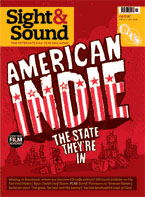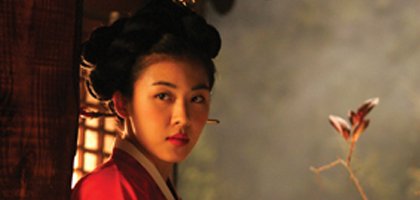Primary navigation

Korea 2005

Reviewed by Tony Rayns
Our synopses give away the plot in full, including surprise twists.
Once upon a time in Korea, soon after a young prince has taken the throne, the country is plunged into hyperinflation by a flood of counterfeit coinage. Trying to find how the fakes are brought into circulation, veteran policeman Ahn and his unruly young woman partner Namsoon spot and challenge a masked man who seems to be guarding a wagonload of fakes through a bustling market. The man disappears near the home of Minister of Defence Song Pil-Joon, and police intelligence suggests that he might be Minister Song's longtime protégé Gu Jang-gon.
Ahn and Namsoon start following Gu, who proves adept at giving them the slip. Namsoon finds herself confronted and challenged to a duel by the masked man in a dark alley at night; her adversary suddenly disappears. The police discover that the coins are being forged on boats and distributed via the country's canals; Namsoon is sure that Minister Song is behind the plot. Disguised as a servant, she infiltrates the minister's birthday party and overhears him tell Gu Jang-gon that his aim is to provoke social chaos and then seize power by marrying his daughter to the royal heir. After an inconclusive duel with Gu, the lovelorn Namsoon lapses into drinking and insubordination. She and Ahn are suspended from duty.
Ahn and Namsoon search Minister Song's house for incriminating evidence just as Gu turns on his mentor, suspecting that he's acting in his own (rather than the country's) interests. Ahn later leads a raid on the mansion and arrests the minister. He tells Namsoon that Gu was killed in the fray, but she is by now lost in romantic fantasies of erotic duels with the masked man.
At first glance Duelist seems a Korean simulacrum of the films that have won Zhang Yimou a mass audience in the west, Hero (2002) and House of Flying Daggers (2004): an over-designed, over-coloured and generally over-egged pastiche of a martial-arts movie, aimed at an audience easily impressed by CGO (computer-generated orientalism). Lee Myung-se certainly has no more commitment to the martial-arts genre than Zhang Yimou does, but he has a more credible history than Zhang of playing with genre for his own ends - and nobody has ever accused him of being opportunistic or insincere in his work. Duelist is not his finest hour, but it develops an erotics of swordplay which is original, distinctive and finally rather touching.
It's hard to say whether it's a weakness or a strength that the film has virtually no plot. It does have one large macguffin in the form of boatloads of counterfeit money (they turn out to be part of an offscreen conspiracy to unseat the monarch), but the film is preoccupied with a tomboy's moonstruck pursuit of an unattainable lover and the 'mystery' fades away long before it reaches closure. Namsoon (relative newcomer Ha Ji-won) is the young female sidekick of veteran cop Ahn (the great Ahn Sung-ki in his fourth Lee Myung-se film), working to crack the counterfeiting case, sidetracked and then derailed by her infatuation with the eyes of a masked villain. Not content with placing the star-crossed couple on opposite sides of the law, Lee also suggests that there are major sexual complications: Namsoon is a distinctly boyish girl who fights, drinks and swears like a trooper, while the villain's mask hides the androgynous Gu Jang-gon (former model Gang Dong-won), the 'kept boy' of the louche minister of defence.
The film plays more like a rhapsody than either an action movie or the detective thriller suggested by the police-procedural aspects. With this goes a rhapsodic disdain for historical fact (there were no young women constables, feisty or otherwise, in the Chosun Dynasty) and a rhapsodic delight in the aesthetics of colour, movement and texture. You could say much the same about Hero, of course, but Lee doesn't embalm his visuals in a formaldehyde of kitsch. The dazzling opening scene in a crowded market, for example, is one of the most purposively confusing sequences ever mounted: a sustained montage of incidents, characters and acrobatics that's impossible to read as narrative on first viewing but that leaves vivid impressions of both Namsoon's 'virility' and the masked villain's allure and underlying melancholy. Virtually any shot in any Zhang Yimou movie could be frozen to produce a 'pretty' still, but that wouldn't work here: the sequence is built purely on motion and quicksilver cutting.
Duelist is a comeback film for Lee, who spent the six years after his international hit Nowhere to Hide (1999) based in New York, failing to set up an American film. Whatever he thought about Hero and Flying Daggers during this long hiatus, Duelist is in many ways entirely consistent with his other films. His central theme from the start has been erotic/romantic desire, and nearly all his films have explored obstacles to desire. His brilliant debut Gagman (made in 1988, eight years after the Gwangju massacre and five before the advent of civilian governments) implied that its eccentric characters' dreams were thwarted by the appalling state of the nation, but Lee subsequently left politics aside and began to focus on psychological and sexual blockages. The other constant has been his hostility to conventional 'realism'.
And so Duelist rethinks swordplay as a dance of courtship, with thrusts and parries representing the desires and fears of the untamed heart until death - the only possible climax to a duel - is transcended in a never-ending fantasy of airborne combat, kept aloft by passion alone. This is a powerful, almost metaphysical image for desires that are impossible in the real world, matched in Lee's cinema only by the climax of First Love (1993), in which the intensity of a schoolgirl's hopeless crush on her Baudelairean drama teacher animates the entire contents of her home. Duelist is let down by too-broad elements of slapstick comedy, but its visuals are spiffy and the single-minded redirection of the martial-arts genre is admirable.